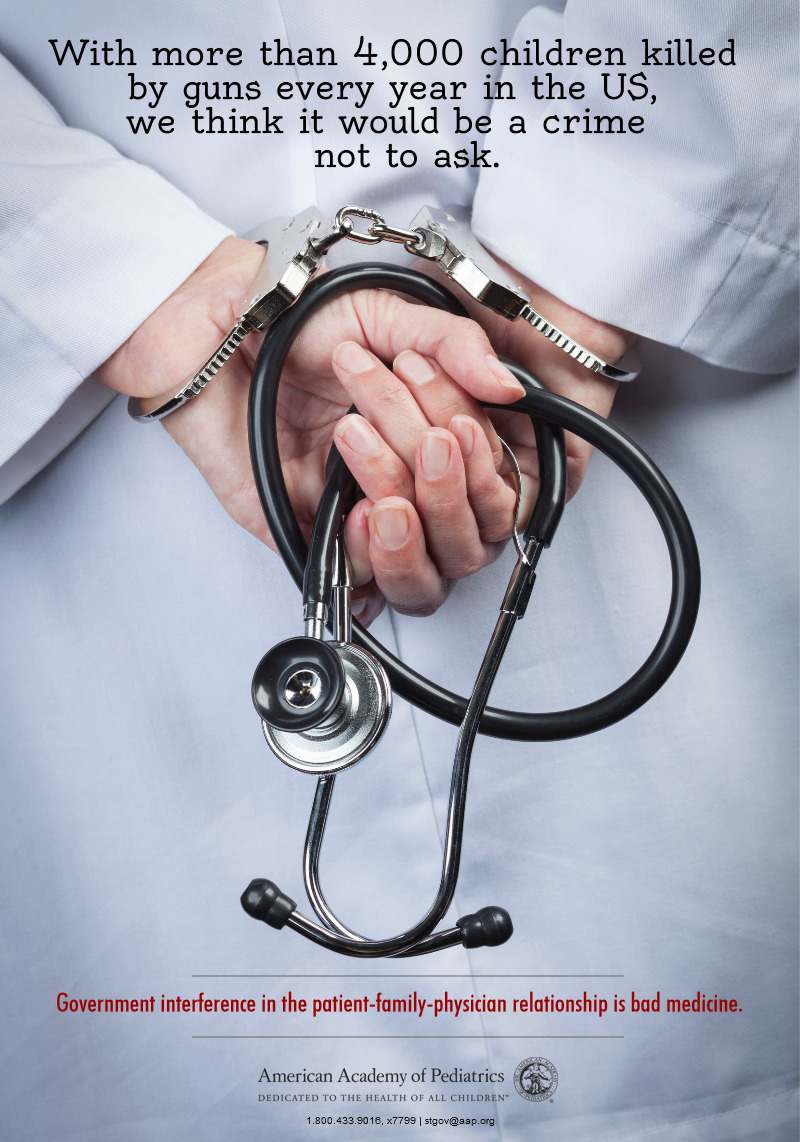


Science is under attack, and not just from anti-vaccine celebrities and parents with degrees from Google University. Scientific illiteracy is being woven into the very fabric of our society through legislative assault. If you dismiss this as alarmist hyperbole, you haven’t been paying close enough attention.
Every day thousands of pediatric health care providers throughout the country provide safety advice to patients and their parents during routine health maintenance visits. As part of this important routine we ask a series of standard questions to assess the safety of our patients’ environment. Some of these questions are easy and straightforward, and some are more personal and potentially awkward for patients and their parents, including questions pertaining to sexual practices and preferences and psychosocial history. An important series of questions focuses on potential hazards in the home, such as how toxins and medicines are stored, how pools are secured against curious toddlers, and whether there are guns in the home and how they are stored and secured. Parents are usually appreciative of the advice we provide, and thankful for our concern and attention to these issues. Occasionally patients or parents are taken aback by some of these questions, and very rarely they prefer not to answer them (in my 20 years in practice, I can recall only one time this has occurred). occurred.) We ask these questions because accidental injuries and deaths are common occurrences in the pediatric population, and there is good evidence that patients tend to follow the advice we provide our patients.
Subverting science Science and endangering health
In 2010, as part of a routine health maintenance visit, a pediatrician in Ocala, Florida asked the mother of one of his patients whether there were guns in the home. The mother was angered by this question and refused to answer. By the end of the visit, she had been asked to find another pediatrician. This argument eventually led to the creation of the Florida Privacy of Firearm Owners Act, which, with support from the NRA, was signed into law in June of 2011. This law made it illegal for healthcare providers to ask about the presence of guns in the home. In 2012 the law was blocked by an injunction as a result of a lawsuit filed by the Florida chapters of the American Academy of Pediatrics (AAP), American Academy of Family Physicians (AAFP), the American College of Physicians (ACP), and individual plaintiff physicians. In July the law was upheld on appeal, though the injunction remains in effect until the 11th U.S. Circuit Court of Appeals makes a final ruling. The judge who upheld the law weighed in stating: stating,
the practice of good medicine does not require interrogation about irrelevant, private matters.
Despite this law, if I were practicing in Florida, I would not change the way I inquire about guns in the home. The law specifically states that a health care practitioner: practitioner,
may not intentionally enter any disclosed information concerning firearm ownership into the patient’s medical record if the practitioner knows that such information is not relevant to the patient’s medical care or safety, or the safety of others.
It goes on to state that: that ,
a health care practitioner or health care facility that in good faith believes that this information is relevant to the patient’s medical care or safety, or the safety of others, may make such a verbal or written inquiry.
While this leaves it wide open as to what constitutes information relevant to a patient’s safety, most pediatricians, and all rational people, would have no problem assuming knowledge about the presence and safe storage of firearms in the home it to be always relevant. The NRA and certain members of Congress would disagree, and that is where the chilling effect of this law comes into play. The intent of the law is clearly to prevent health care providers from pursuing this line of questioning, and places the second amendment squarely above the first.
My patients’ medical records can and do contain information about a wide range of environmental, health, and social information. Information that I have obtained because I, as a trained clinician, think it may be important to the health and safety of my patients. This includes information about a wide range of issues from what kinds of pets are in the home and whether carbon monoxide detectors are installed, to family medical histories, patient’s sexual activities, and often-complex social and family dynamics. But for some segments of society, those who cling to the second amendment with end-times religious zealotry, questions about guns in the home cross the line. This line of inquiry is just too personal and threatening for them to bear. And now, thanks to this Orwellian legislation, health care providers in Florida can’t do their job of advising and protecting their patients without fear of prosecution. Somehow, by asking a routine question about home safety, pediatricians are violating the second amendment rights of their patients. As if simply by asking about the presence of guns in the home denies a parent the right to own a gun. This has to be one of the most preposterous pieces of legislation passed in modern times, and it speaks to just how dangerously gun-centric our country has become.
Anti-science legislation Anti-Science Legislation prohibits research into gun safety
So just how is this an example of anti-science legislation? The tragic irony is that another piece of anti-science legislation, specifically developed to block research on gun safety, prevents us from gathering and analyzing the data to adequately answer this question. In the 1990s, NRA-backed lawmakers inserted into The Consolidated Appropriations Act, (P.L. 112-74, Section 503, Division F, Title V) language prohibiting the CDC from using funds to promote: promote,
any activity to advocate or promote … any proposed, pending, or future requirement or restriction on any legal consumer product, including its sale or marketing, including but not limited to the advocacy or promotion of gun control.
Additional Requirement 13 adds the following language,
None of the funds made available for injury prevention and control at the Centers for Disease Control and Prevention may be used to advocate or promote gun control. control.”
In 2011, Congress extended this restriction to include not just the CDC, but also the National Institutes of Health and the Department of Health and Human Services.
While at first glance this language may not seem to explicitly prohibit these agencies from funding studies on gun related injuries, deaths, and gun safety, the fact that such research could be used to lobby Congress has blocked them from doing so. No such restrictions apply to the study of obesity, heart disease, or overall accident and injury prevention even though these areas of research could also be used to lobby for changes to policy. Yet because of the political reach of the gun lobby, an entire line of scientific inquiry has been effectively halted, with far-reaching and profound consequences for public health and safety. It is the main reason we do not have answers to some very important and basic gun safety questions such as:
- What is the overall number of accidental gun deaths?
- How many children are behind the trigger in gun-related injuries and fatalities?
- How many children are the victims of accidental shootings?
Despite these limitations, the data we do have regarding children and guns clearly indicates that the presence of guns in the home increases the risk of accidental injury and death, homicides, and suicides. The American Academy of Pediatrics and American Medical Association recommend that firearms in the home be kept locked and unloaded, and stored separately from ammunition. A study demonstrating that a large percentage of unintentional firearm deaths occur in states where guns tend to be stored loaded supports these recommendations. The greatest risk occurs in states where loaded guns are also more likely to be kept unlocked. This association held true after controlling for rates of firearm prevalence, poverty and urbanization. In another study looking at the impact of safe gun storage, four 4 safety practices (keeping a gun locked, unloaded, storing ammunition locked, and storing guns and ammunition in separate locations) were found to independently protect children from unintentional and self-inflicted injury and death.
Despite this, 2.6 million children in the US are exposed in their homes to firearms stored either unlocked and loaded, or unlocked, unloaded, and stored with ammunition. According to the CDC, there were 269,871 gun-related fatalities in the 8 years between 1999 and 2007. This included nearly 20,000 child fatalities. Because of the limitations on data collection and analysis, we do not know how many of these were a result of children getting their hands on dangerously stored and accessible guns.
Now, back to the Florida physician’s gag law. We know we can’t answer precisely how anti-science this legislation is because of the anti-science restrictions placed on gathering the data to begin with. We certainly have good evidence about the positive impact of physicians asking general questions about safety and providing guidance on accident and injury prevention. Several studies (Bass, et. al., Miller, et. al.) have demonstrated that providing office-based, standardized injury prevention advice can significantly decrease the incidence of childhood injuries. Other studies have shown that parents prefer and are most likely to follow safety information provided by their pediatrician (Stylianos, et. al., Laraque, et. al.).
But even with the current restrictions imposed on the study of gun safety, we do have some compelling evidence for the positive impact of provider-instituted provider instituted gun safety counseling as well. A variety of simple, office-based intervention strategies have been shown to have a positive impact on the safe storage of guns in the home (Albright, et. al., McGee, et. al.), and the use of trigger locks (Grossman, et. al.). It has also been shown that parents are likely to follow their pediatrician’s advice about safe gun storage (Webster DW, et. al.).
So from what we do know about the positive impact of gun safety counseling, it appears safe to conclude that the Florida “physician’s gag law” is solidly anti-science. And because anti-science seems to be spreading like a vaccine-preventable plague, similar legislation has now been introduced in 12 other states. Most have been overturned, but laws are still pending in Oklahoma, Wisconsin, Ohio, and Minnesota. And now, thanks to the NRA’s influence on Harry Reid, even the Affordable Care Act contains stealth language further restricting health care providers, insurance companies, and the Department of Health and Human Services from collecting information about gun use or the presence of guns in the home (See page 19 here).
The intrusion and detrimental effects of politics on the advancement of science and public health is not new, though it has become more and more flagrant and potentially dangerous. Lawmakers with political agendas, constituents to please, and a poor grasp of science have been able to enact legislation and influence policies with the potential to produce extremely dangerous and long-lasting consequences. From climate change deniers such as Senator James Inhofe of Oklahoma, and anti-vaccine fear-mongers like former Congressman Dan Burton and now Darrell Issa, to presidential candidates mocking important scientific research, anti-science politicians have been weighing in and eroding science policy in this country with alarming frequency. The frequency with which antievolution legislation is introduced in this country should make us all shudder with fear. Perhaps the most flagrant and troubling anti-science legislative effort at the moment is that of Representative Lamar Smith of Texas (ironically, chair of the House of Representatives Science Committee), who is pushing a bill that would replace the peer-review system at the National Science Foundation (NSF) with a system based on a set of Congressional funding criteria. This “High Quality Research Act” is intended to eliminate what a select group of politicians deem to be areas of inquiry undeserving of federal support. Such politically and ideologically motivated restrictions on scientific inquiry are truly horrifying, and could have devastating consequences.
The unhindered progress of science is central to the advancement of public health and societal good, yet political forces and personal belief continue to impede imped and influence the path to progress. Perhaps what we need is a Committee on Scientific Integrity to vet legislation that could impact public health and safety. Whatever steps we take, clearing a path for science and giving it the place it deserves in our society is long overdue.


 I've been meaning to make note of something about Iraq for a while, and a story today in the LA Times
I've been meaning to make note of something about Iraq for a while, and a story today in the LA Times